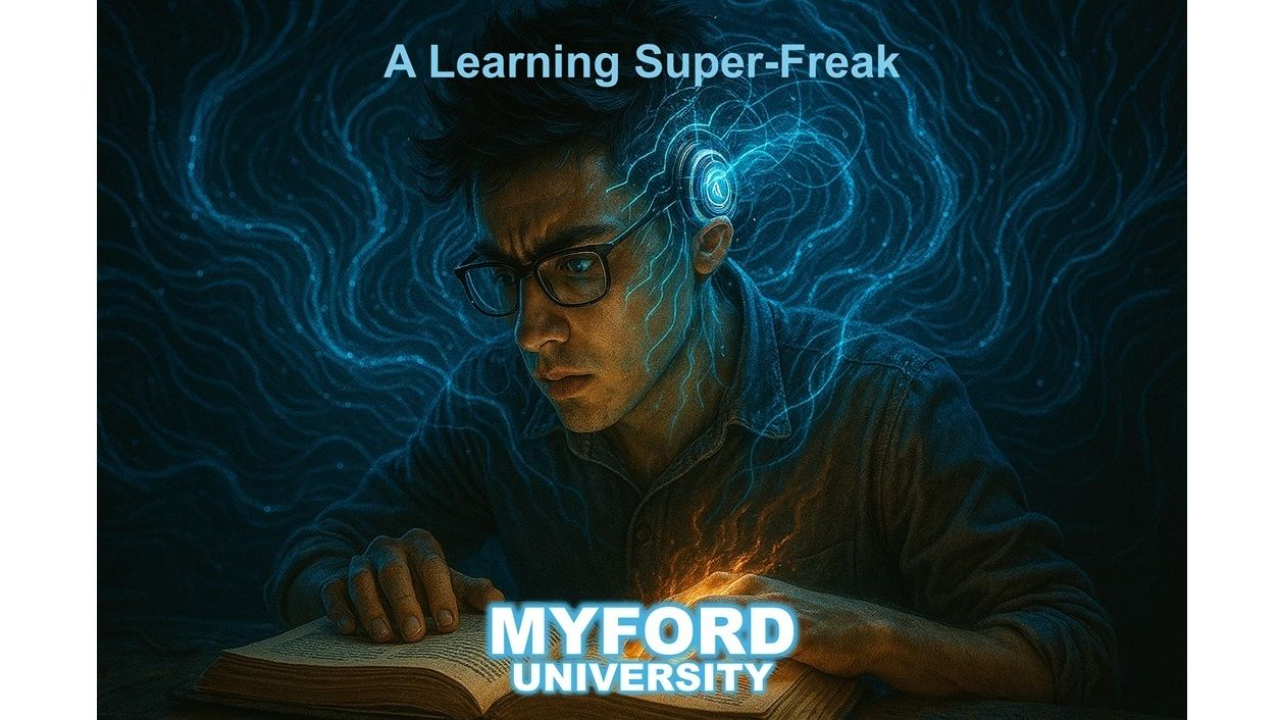Learning Super-Freak: How to Become Addicted to Growth and Own Your Lifelong Education
Aug 05, 2025
“I’m a chemical super-freak actually.”
— Stanley Goodspeed (played by Nicolas Cage), in the movie, The Rock
I like to think of myself a little differently:
I’m a learning super-freak.
If you're reading this, you might be too—or want to be.
Over the last three years, I’ve completed dozens of courses, read books cover to cover, sat through workshops, earned certifications, and gobbled up podcasts and whitepapers like popcorn. I do it in bursts. Sprints. Obsessive, focused deep dives into subjects that catch fire in my brain.
And I’ll tell you this: it’s one of the best decisions I’ve made.
In a world that moves faster than any degree program can keep up with, being a “learning super-freak” isn’t just a personality quirk—it’s a survival strategy, a superpower, and frankly, one of the only competitive advantages that still works in the 21st century.
This article is about what it means to embrace that mindset, how to make it work for you, and why it just might be your most important asset—personally and professionally.
What Is a Learning Super-Freak?
Let’s define it first.
A learning super-freak is not just someone who likes to learn. Lots of people like learning in theory—few make it a way of life.
A learning super-freak:
- Has an insatiable curiosity
- Pursues new knowledge and skills deliberately, aggressively, and consistently
- Applies what they learn almost immediately
- Sees learning not as a phase, but as a forever habit
- Builds their own self-education curriculum on the fly—based on goals, problems, or interests
- Thinks in sprints, builds in loops, and refines with action
In short: you devour knowledge with a purpose.
You upgrade yourself like it’s a system patch.
You learn, apply, evolve, and repeat.
It’s not a hobby.
It’s a way of operating in the world.
Why Be a Learning Super-Freak?
Let’s use the classic five W’s and one H approach to break it down.
Why? — Because the World Has Changed, and the Rules Have Too
The old model said:
Get a degree. Get a job. Settle in. Maybe take a seminar every few years.
That model’s dead.
New technology, AI, automation, economic shocks, global competition—none of these are slowing down. In fact, they’re speeding up.
A college degree today may be 10–20 years behind current skills. That MBA curriculum you spent $200K on? Already obsolete in parts by the time you graduate.
So what do you do?
You become your own university. Your own teacher. Your own R&D department.
If you're not constantly learning, you’re falling behind. Full stop.
What? — The Super-Freak Approach to Learning
This is not about getting a bunch of letters after your name.
It’s about acquiring practical knowledge and skills that serve your goals—right now, this quarter, this year.
Here’s what my bursts have included over the last 3 years:
- Online courses on topics like strategy, marketing, negotiation, project management, and AI
- Certifications in everything from agile to safety to analytics
- Books—not just skimming, but full reads, highlighted, annotated, and applied
- Workshops and intensives, both virtual and in-person
- Coaching programs, where I learned directly from someone farther along than me
- Peer groups, masterminds, and forums where knowledge is exchanged in real time
I don’t wait for permission or a syllabus. I go after what I need—and I build a mental arsenal as I go.
That’s what makes it “super-freak” level.
It’s not passive. It’s not polite. It’s relentless.
Who? — Who Should Embrace This?
Short answer: Everyone who wants to win.
Longer answer: If you are in a field that is changing, growing, or being disrupted—this is for you.
That includes:
- Corporate professionals who want a raise, promotion, or lateral move
- Entrepreneurs who need to rapidly build competence in dozens of areas
- Small business owners trying to outmaneuver competitors
- Tradespeople upskilling with digital tools and software
- Contractors and consultants who are only as valuable as their current capabilities
- Freelancers and solopreneurs building their brands and businesses from scratch
And here’s a little secret:
If you're human and living in this economy—you’re already in the game. You just might not know it yet.
When and Where? — Learning Happens Anytime, Anywhere
The learning super-freak doesn’t wait for the perfect conditions.
I’ve studied during commutes, between meetings, on lunch breaks, in hotel rooms, on trains, and on airplanes. I’ve learned from YouTube on a treadmill, podcasts while walking, and downloaded PDFs for when I had no Wi-Fi.
My approach?
- Microbursts of 10–20 minutes daily
- Deep dives on weekends
- Focused sprints when I need to upskill fast (like before launching a project)
You don’t need a classroom.
You need a mindset, a goal, and a resource.
That’s it.
Where? — Use the Tools You Already Have
You already have a world-class learning platform in your pocket: your phone.
A learning super-freak uses what’s available:
- YouTube for tutorials
- LinkedIn Learning for professional topics
- Coursera, Udemy, Teachable, Kajabi for deeper courses
- Podcasts for context and insight
- Kindle for books and case studies
- PDFs, cheat sheets, templates, and community posts
If you have Wi-Fi and a will, you can learn almost anything.
You don’t need an Ivy League building to get Ivy League results.
How? — My Personal Framework for Super-Freak Learning
Here’s my personal 5-step cycle that has worked time and time again:
- Pick a Target
Ask: What do I need or want to learn right now?
- Do I need to lead better?
- Market better?
- Sell more?
- Understand AI?
- Communicate more clearly?
Pick ONE focus area and go all-in.
- Build a Micro-Curriculum
Don’t just pick a random video.
Build a short “course” for yourself.
For example, when I wanted to master digital marketing, I:
- Bought a foundational course
- Read 2 recommended books
- Subscribed to 3 podcasts
- Watched 10 tutorials
- Joined a private Facebook group
- Downloaded templates
- Applied my learning to a project
All in a 2-week sprint.
- Learn in Layers
Don’t just do one pass. Stack your learning.
- First layer: Overview and key concepts
- Second layer: Real examples, applications, mistakes
- Third layer: Do it yourself—messy and imperfect
- Fourth layer: Review and refine
Learning sticks when you do, not when you just watch.
- Apply Immediately
Knowledge that isn’t used gets lost fast.
So the rule is: learn it, then do it.
- Run a test
- Create a mini-project
- Teach it to someone
- Build a deliverable
- Use it at work
- Incorporate it into a decision
This is how learning becomes capability.
- Reflect and Iterate
Ask:
- What worked?
- What didn’t?
- What should I double down on?
- What should I ignore?
- What do I need next?
Learning is never finished. It just loops and levels up.
The Benefits of Becoming a Learning Super-Freak
Let’s talk ROI.
When you go hard on self-education, here’s what happens:
- You Build Massive Confidence
You don’t feel stuck or behind—you know how to catch up fast.
You become dangerous in the best way: capable, adaptive, resilient.
- You Accelerate Your Career or Business
Whether it’s a promotion, a pivot, or launching something new—your ability to learn fast makes you the linchpin.
People will pay for what you know and can do. And they’ll trust you more when they see you growing.
- You Become Impossible to Replace
While others stagnate, you evolve.
That makes you irreplaceable, recession-proof, and future-proof.
- You Get Addicted to Progress
Learning becomes a feedback loop:
- Learn → Apply → Get better → Get rewarded → Want more → Repeat
That’s how you stay hungry, humble, and sharp.
- You Future-Proof Your Identity
You’re not locked into one job title, one industry, or one degree.
You’re a portfolio of skills.
You’re a moving target.
You are built to survive and thrive—even when the world changes around you.
So… Are You Ready to Become a Learning Super-Freak?
If you’ve read this far, you’re not normal.
That’s a compliment.
You already suspect that traditional education is too slow, too expensive, and often too shallow.
You want more.
And here’s the thing:
- You don’t need a fancy credential.
- You don’t need permission.
- You don’t even need a 5-year plan.
You just need to start.
Pick a problem.
Pick a skill.
Pick a topic.
Then chase it down like it owes you money.
Final Thought: Don’t Be Normal
Normal says:
- “I don’t have time.”
- “I already went to school.”
- “I’m not a student anymore.”
- “I’ll learn when I need to.”
Super-freaks say:
- “I make time.”
- “School never ends.”
- “I’m always a student.”
- “I learn before I need it.”
Normal is comfortable.
Super-freak is powerful.
Be powerful.
Next Steps (If You’re Serious)
If this hit home, here’s how to ride the momentum:
- Make a 30-day learning sprint plan.
- Pick 1 skill that would radically improve your career or life.
- Build a mini-curriculum: course, book, podcast, templates.
- Block 30 minutes a day.
- Apply as you go.
- Track wins.
- Repeat.
If you do this just once every 60 days, you’ll be unrecognizable in a year.
At Myford University, This Is the Norm—Not the Exception
Here, we teach you how to learn fast, think critically, and build real-world capability without wasting four years or $200K.
We respect learning super-freaks because we are learning super-freaks.
We believe education should be practical, accelerated, and always in motion.
So join us.
Get weird about learning.
Be a little obsessed.
Be relentless.
Be a super-freak.
SIDE NOTE: Not a Flex, Just the Facts. Over the last three years, I have completed:
- About 80 free corporate training courses (some mandatory and most voluntary)
- Over three dozen free micro-certifications
- Well over a dozen certifications with associated paid courses
- Dozens of books, and
- Thousands of hours of videos and podcasts while commuting, exercise walking, and in lieu of TV viewing.
I’m probably forgetting a few things, but I think you get the picture. I tend to layer my learning stacks to get additional leverage and I apply new learning immediately to maximize the value I receive and deliver as fast as possible – I’ll do a separate article about this in the future and share some of my hacks.
Stay connected with news and updates!
Join our mailing list to receive the latest news and updates from our team.
Don't worry, your information will not be shared.
We hate SPAM. We will never sell your information, for any reason.

